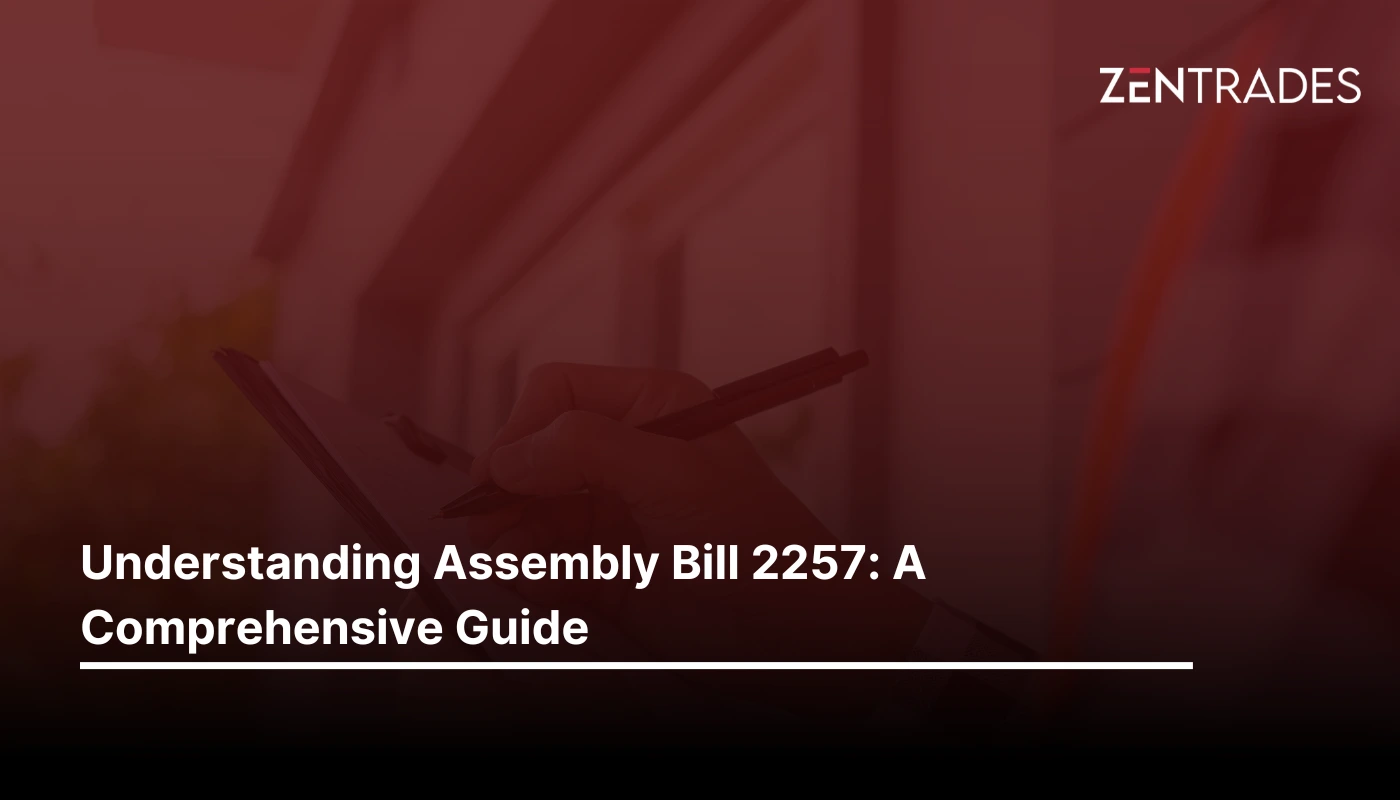Understanding Assembly Bill 2257: A Comprehensive Guide
- Field Service Management
- 9 Min Read
A crucial statute controlling worker categorization in California was drastically changed by Assembly Bill 2257.
Beginning in 2020, a new law known as Assembly Bill 5 (AB5), often known as an independent contractor statute, forced businesses operating in California to alter how they classified their employees.
Eight months after Assembly Bill 5 (AB5) took effect in California as the law governing independent contractor agreements, businesses now have to adjust to yet another significant change due to the adoption of Assembly Bill 2257.
The California Assembly Bill (AB) 2257, signed into law by Governor Gavin Newsom on September 4, 2020, made minor adjustments to AB5 and included new industries qualified for an exemption from the “ABC” test.
We’ve put together this guide on California AB 2257 for field service workers to help you remain on top of the situation. The California AB 2257 overview is provided below, along with a list of the specific modifications you need to know before your job.
We at SmartServ have created a knowledge vault for plumbing contractors and technicians like yourself. Head to our website for more informative articles to enhance your business knowledge.
SmartServ’s field service management software can also streamline and optimize your workflow to generate growth and more revenue for your business!
Book a FREE demo today to start streamlining your workflow!
Here What We Cover
What is Assembly Bill 2257?
State legislation known as Assembly Bill 5 is based on the Dynamex Operations West, Inc. v. Superior Court ruling from the California Supreme Court in 2018. It establishes the “ABC” test as the de facto guideline for determining whether independent contractors may be classified as employees of a hiring organization, in effect from January 1, 2020. The hiring body must show that potential independent contractors meet each of the requirements listed below:
- When performing the job, the individual is not subject to supervision or control by the hiring company.
- The individual completes tasks the hiring organization’s clients do not typically do.
- The person typically works in a trade, occupation, or business of the same sort as that involved in the task performed that has been independently established.
A long list of businesses and professions exempt from the regulation is also outlined in AB5, including some salespeople and attorneys. The standard law test for employment, known as the “Borello” test, will be used to establish the employment status of independent contractors employed in a profession exempted by one of the exemptions, provided specific requirements are satisfied.
However, substantial debate and misunderstanding over the exemptions specified in AB5 have prompted some companies and employees to want more explanation. In response, the Legislature filed 34 separate pieces of legislation exempting specific industries as of February 2020. The majority of these bills have been combined into the new AB2257.

Use our free estimate template now
Make winning quotes in minutes—for any industry and any job.
How does the new Assembly Bill 2257 impact the Contractor Law?
Litigation started as soon as AB 5 was passed. Because the new statute was preempted, a few courts enjoined it as it related to certain interstate trucker independent contractors. In the works appeal. Although appeals may still be pending, other legal challenges, including those of several independent journalists, initially failed. On the other hand, most of the law was put into practice. Additionally, it was recently ruled that Uber and Lyft cannot continue to use the independent contractor business model. Due to their appeal, the injunctions have been put on hold.
Additionally, there was a strong response against AB 5 from independent contractors themselves. This is so that the bill wouldn’t apply to many independent contractors and freelancers who, it seems, didn’t want to be “helped” by the Legislature.
What are the multiple exemptions included in the AB2257 Law?
The “ABC” test continues to be the de facto standard for determining who is an independent contractor and who is an employee under Assembly Bill 2257. While AB2257 does not modify the fundamental structure of AB5, it does include several new statutory exemptions from the “ABC” test that, where appropriate, also apply retrospectively. Following vigorous lobbying and public relations campaigns from numerous businesses within the sectors that are now exempt, this new law was passed. Here are the primary modifications brought forth by Assembly Bill 2257:
Business-to-Business Exemption
AB2257 maintains the exemption for “bona fide B2B contracting relationships” where a contractor should act “as a solitary owner, or a business entity formed as an association, limited harm company, limited liability collaboration, or corporation agreements to provide services to another such business.”
The 12 requirements for this exemption still need to be completed by the worker to qualify, no matter how slight any conditions may be. Because many business-to-business independent contractor arrangements cannot meet even one of the standards, they may still need help to benefit from this exception.
Exemption for “Single-Engagement” Business-to-Business Contracts
AB2257 establishes an exemption for individual businesspeople who enter into agreements with one another “for providing services at the location of a single-engagement event.” If specific requirements are met, the “ABC” test will not be applicable when one person contracts with another to provide services at “a one-time non-repetitive event in a single place, or a series of events in the same place no more than once a week.”
Referral Agency Exemption
AB2257 clarifies the referral agency exemption, under which organizations that recommend a person’s services to customers in a specific industry may be exempt from the “ABC” test.
First, AB2257 dramatically broadens the referral agency exemption by adding new services that will now be subject to the “Borello” test, such as advising, coaching minor sports, caddying, arranging weddings or events, services offered by wedding and event vendors, and interpreting services. One of the most important modifications to AB2257 was this enlargement.
Nevertheless, AB2257 makes it clear that independent contractors working in the following industries are not eligible for the referral agency exemption:
- The following ten industries are also included: janitorial, delivery, courier, transportation, trucking, agricultural labor, retail, logging, in-home care, and construction services other than minor house repair.
- “Industries designated by [two designated state agencies] as a high hazard industry” is another group.
Second, the exemption now contains 11 conditions instead of the ten requirements that referral agencies had to satisfy to be eligible. Only a small number of referral organizations will likely be able to meet all the criteria for the exemption.
Service Providers Are Exempt
The list of professions that may be exempt from the “ABC” test following the professional services exemption is already rather long, and AB2257 adds to it. Due to AB2257, the following newly created professions might be subject to the “Borello” test for employment:
Specialist performers hired to teach a lesson for up to a week; content writers, advisers, producers, narrators, or cartographers for specific publications; appraisers; qualified professional foresters; and home inspectors.
AB2257 also repeals AB5 regulations that put the journalism sector in danger. Under AB5, there were restrictions on how many “submissions” different kinds of independent contractors (including still photographers and photojournalists, videographers, photo editors, freelance writers, translators, editors/copy editors, and illustrators/newspaper cartoonists) could publish in a single forum without losing their contractor status. The submission cap is now eliminated by AB2257, which mandates that companies refrain from laying off current workers to hire one of these categories of contractors.
Performing arts and the music industry Exemptions.
According to AB 2257, the music sector gains several new exemptions:
Recording artists, songwriters, lyricists, composers, proofreaders, managers of recording artists, record producers and directors, musical engineers and mixers, musicians, vocalists, photographers, independent radio promoters, and specific categories of publicists are among the careers exempt from the ABC test.
As long as they adhere to specified requirements, musicians and musical groups hired for a one-engagement live performance event are exempt from the ABC test.
Individual performers who perform their creative works, such as comedians, improvisers, magicians and illusionists, mimes, spoken-word artists, storytellers, and puppeteers, are eligible for an exemption if certain conditions are met.
Additional New Exemptions
AB 2257 adds several new exemptions, including those for competition judges (including amateur umpires and referees), manufactured house salespeople, and some people employed by overseas exchange visitor programs.
Catch AB2257
Assembly Bill 5 was contested in court immediately after it was passed. The main criticisms came from hiring companies and (former) independent contractors, who emphasized how complicated it was to demonstrate each of the three requirements, especially in freelancing labor. The three-component test would probably fail many independent employees (such as authors, truck drivers, and freelance photographers).
Assembly Bill 5 had good intentions, but because of its rigidity, the freelance community reacted negatively, which was understandable. It soon became apparent that AB 5 needed to be improved.
Get posts like this in your inbox.
Keep learning how to run a 5-star business with our bi-weekly newsletter.
Conclusion
Despite some additional clarification provided by AB 2257 on existing exemptions under AB 2257 and the expansion of exemptions for particular industries, misclassification continues to pose a danger to California companies due to the complexity of the state’s current regulations.
Additionally, it’s crucial to remember that, even in cases where an exemption is valid, the common law Borello multi-factor test must still be used to ascertain the worker’s status. Employers should categorize workers with the utmost care and review both new and current worker categorization in-depth with legal counsel.
To alleviate the contractor’s and technician’s burden, one should seek the assistance of a field service management software like SmartServ.
Book a personalized demo to see how SmartServ can optimize your business!

Explore a better way to grow your business. Book a free demo now!
Get organized, win jobs, and wow customers.
Book A Free Demo with ZenTrades Today!
Related Reading
Why Your Field Software Management Software Needs QuickBooks Integration
ZenTrades Why Your Field Service Management Software Needs QuickBooks Integration Read More Request Demo...
Read MoreZenTrades How To Manage Electrical Service Agreements Like...
Read MoreZenTrades The Best 5 Jobber Alternatives In 2023...
Read More


